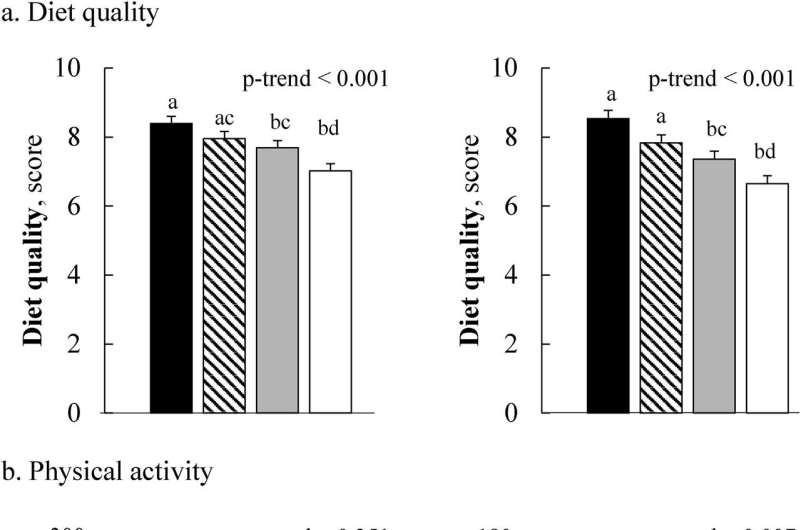This article has been reviewed according to Science X's editorial process and policies. Editors have highlighted the following attributes while ensuring the content's credibility:
fact-checked
peer-reviewed publication
trusted source
proofread
Using screens before bedtime and going to bed late associated with increased risk of childhood obesity: Study

Going to bed later than 10.00 p.m. and using screens (tablets, mobiles, computers, television, etc.) for more than thirty minutes before bedtime is associated with an increased risk of obesity and reduced adherence to the Mediterranean diet in children, according to a study by the University of Barcelona (UB).
The study, published in the journal Appetite, highlights that a significant percentage of children, 27.5% of preschoolers and 35.2% of school-age children, spend more than thirty minutes in front of a screen device before bedtime.
"We have observed that preschool and school-age children who have more nocturnal sleep habits and spend more time in front of screens before bedtime have a higher risk of developing overweight or obesity, compared to those who go to bed early and do not watch screens before bedtime," says María Fernanda Zerón-Rugerio, first author of the study, who is a professor at the Faculty of Nursing and a researcher at the UB's Food and Nutrition Torribera Campus and the Institute for Research in Nutritional Nutrition, and member of the Institute for Research in Nutrition and Food Safety (INSA).
The study was led by Professor Maria Izquierdo-Pulido, from the UB's Faculty of Pharmacy and Food Sciences and the Food and Nutrition Torribera Campus, and a researcher at INSA. Alicia Santamaría, from Laboratorios Ordesa, has also participated.
Poor sleep quality and less physical activity
The researchers also found that the combination of these two behaviors resulted in a shorter nighttime sleep duration and poorer sleep quality in both preschoolers and schoolchildren. These variables were also associated with delayed breakfast and dinner times, especially as children got older.
In addition, school-age children who maintained this combination of unhealthy habits also experienced greater social jet lag and were less physically active.
"This is common among late sleepers, who have to adjust their wake-up time to fit school schedules rather than their actual sleep needs. As a result, they end up sleeping less and accumulating sleep debt throughout the week, a situation that has been associated in previous studies with irritable mood, poor academic performance, and daytime sleepiness," the researchers explain.
Only 11.7% of school-age children do not use screens and go to bed early
The study was based on data collected through online surveys of 1133 children in Spain, of whom 545 were aged between two and four and 588 between five and twelve. These questionnaires analyzed sleep habits and the use of screen devices, as well as other indicators such as diet and body mass index.
Approximately half of the toddlers and school-age children surveyed spent between one and thirty minutes in front of a screen before bedtime (50.5% and 45.1%, respectively), while 27.5% of preschoolers and 35.2% of school-age children spend more than half an hour in front of a screen. The results indicate that only 14.2% of preschool children and 11.7% of school children do not watch screens and go to bed early.
The researchers were also surprised by the sleep schedules of the study participants. "We found that children tend to go to bed around ten o'clock at night. Considering that it is recommended that they sleep between ten and twelve hours, it is clear that many children do not get enough sleep," they say.
Considering this situation, the UB experts recommend "bringing bedtime forward and reducing exposure to screens as much as possible before bedtime, ideally avoiding them completely at least one hour before bedtime." These recommendations are also supported by the American Association of Pediatrics.
For the UB researchers, in the case of children, it is "crucial to address obesity prevention and lifestyle factors that can be modified to promote healthy growth and development." These factors include bedtime and screen time before bedtime. "These are aspects of modern lifestyle that are associated with unhealthy eating habits and reduced adherence to healthy eating patterns, such as the Mediterranean diet. If these habits are maintained, they can lead to obesity," they conclude.
More information: María Fernanda Zerón-Rugerio et al, Late bedtime combined with more screen time before bed increases the risk of obesity and lowers diet quality in Spanish children, Appetite (2024). DOI: 10.1016/j.appet.2024.107293


















